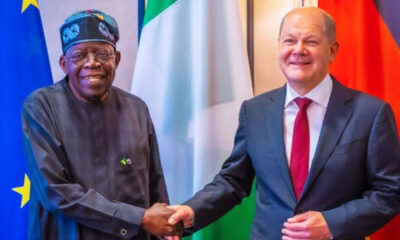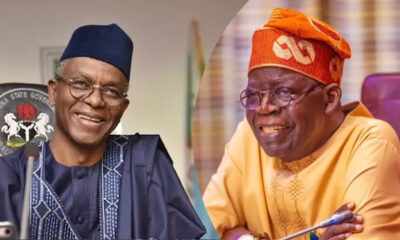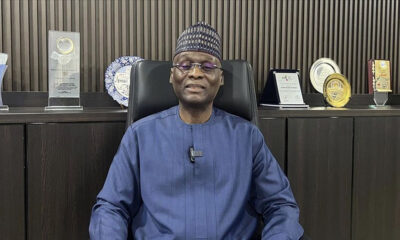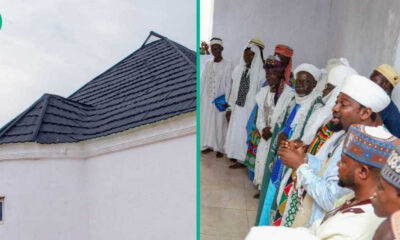Opinion
Tinubu getting governance right but economy wrong – Farooq Kperogi

Tinubu getting governance right but economy wrong – Farooq Kperogi
It takes a special kind of partisan bullheadedness— or an acute amnesia of the immediate past— to fail to acknowledge that President Bola Ahmed Tinubu has, in the last few weeks, enlivened governance, shown praiseworthy sensitivity to public opinion, and has exerted unaccustomed social, symbolic, and political presence in the country.
But it also requires a severely blind partisan loyalty to not admit that Tinubu’s firing of a corrupt minister caught red handed with her hand in the cookie jar, his responsiveness to legitimate public outcries, and his obvious interest in actual governance have not moved the needle in the real living conditions of the majority of Nigerians who are squirming in profound existential hurt as a direct consequence of the unprecedented economic crunch that the removal of subsidies on petrol has activated. I’ll return to this point later.
I am never shy to publicly admit it when I am wrong. Since January 2022 when it became apparent to me that Tinubu would be president, I was distressed. In a January 12, 2022, social media update, I ventilated this distress when I wrote: “No nation can survive a transition from Buhari’s corrupt, do-nothing, geriatric, and dementia-plagued presidency to a drunken, narcotized, geriatric, and potentially corrupt Tinubu presidency.”
I am not ashamed to concede that I am probably wrong and that the people who insisted that Tinubu would be different from Buhari are right—at least for now. By my training and disposition, I am parsimonious with expressions of commendation for people in positions of power. It’s because I know that the privileges and pressures of power can make people unpredictable or change in a fraction of a moment’s notice. But there is no harm in acknowledging demonstrations of good-faith efforts by people in power.
The swift, no-nonsense suspension of Betta Edu as Minister of Humanitarian Affairs and Poverty Alleviation after irrefutable evidentiary proof of her corruption emerged and public outcry for her ouster grew— and the summoning of the Internal Affairs Minister to explain how a company he is associated with benefitted from Edu’s corruption— has scored the Tinubu administration its most visible reputational mileage in governance yet and has caused many critics to thaw their frigidity toward the administration.
READ ALSO:
- Gombe bans illegal nightclubs, brothels
- Another African country eliminates malaria
- Tenant accused of adultery kills bus driver, flees
It doesn’t mean there are no other corrupt government officials who are fleecing the nation, but this is the first time an APC administration has fired a minister for corruption. All past examples of ministers who lost their jobs because of corruption have been during PDP administrations. Olusegun Obasanjo, Umaru Musa Yar’adua, and even Goodluck Jonathan have records of firing ministers who were credibly accused of corrupt enrichment.
Yet, Muhammadu Buhari, who rode to power on the strength of the perception and claims that he was “clean” and was intolerant of corruption, not only never fired a single minister on account of corruption (even though Nigeria lost the most money to corruption during his regime), but he also actually weaponized his symbolic power as president to defend the corruption of his ministers and close associates.
After the alleged corruption of Gen. Tukur Yusuf Buratai, Lt. Gen. Abdulrahman Dambazzau and Babachir David Lawal were published, Buhari’s public response, in December 2016, was, “Terrible and unfounded comments about other people’s integrity are not good. We are not going to spare anybody who soils his hands, but people should please wait till such individuals are indicted.”
But when corrupt people were indicted, he defended them both publicly and privately. For example, when Babachir Lawal was indicted by the Senate for fleecing internally displaced people in the Northeast, Buhari deployed astonishingly bald-faced lies to defend him.
In my January 28, 2017 column titled “Presidential Lying in Defense of Corrupt “Executhieves,” I wrote: “In his letter to the Senate ‘clearing’ Babachir David Lawal of multi-million naira ‘grass cutting’ corruption scandal, the president said the senate didn’t invite Lawal to defend himself. Lie. He WAS invited via a letter, which the permanent secretary attached to his office acknowledged, and via at least three newspaper adverts. But he spurned the invitation and sent a representative.
“The president also said only three senate committee members signed the letter asking for Lawal’s resignation and prosecution. Another lie. Seven senate committee members did.” It was Yemi Osinbajo’s acting presidency that recommended Babachir Lawal’s firing. Left to Buhari, nothing would have happened to him.
We also learned from the Head of Service of the Federation in November 2017 that Buhari was actually aware of, and even countenanced, the scandalous reinstatement and promotion of Abdulrahseed Maina, the former chairman of the Pension Reform Task Force Team who was sacked for stealing 14 billion naira belonging to pensioners. Of course, we all know how Buhari featherbedded Sadiya Umar Farouq who stole way more money than Betta Edu did.
A separate column needs to be written on Buhari’s corruption and how he gave aid and comfort to the worst corruption in Nigeria’s history. It suffices for now to state that Tinubu’s actions would have been mere unremarkable routines in governance had he not been preceded by the worst, most incompetent, and least transparent ruler in Nigeria’s history.
READ ALSO:
- Cult groups write Ogun monarch, beg for forgiveness
- Tinubu appoints Obi Asika, Ali Nuhu, other heads of Art & Culture agencies
- ‘He’s worst manager ever’- Mikel Obi knocks Sunday Oliseh
Nonetheless, the praises that the Tinubu administration is receiving from unlikely quarters shouldn’t lull it into a false sense of self-satisfaction to the point of being unmindful of the damaging consequences of its punishingly harsh economic policies.
I was in Nigeria in December 2023 and saw firsthand the extreme, unbearable, and unexampled adversity that the vast majority of people have been thrown into in the aftermath of the removal of petrol subsidies. The level of suffering people are going through now is simply unsustainable. Something will definitely give if nothing is done urgently.
Since the Tinubu administration has so far shown itself to be amenable to be persuaded on issues that matter to the public, I suggest that immediate steps should be taken to halt the drift to hopelessness that’s taking roots in Nigeria.
In Monarchs and Mendicants, Dan Groat warned: “Not interested in scarin’ anybody, but people with good sense are afraid of a man with nothin’ to lose.” Lance Conrad reiterated the same sentiment in The Price of Nobility when he said, “Only a fool would underestimate a man with nothing to lose.” Extreme deprivation, such as what most Nigerians are going through now, inspires hopelessness, loss of faith in life itself, and a willingness to bring everything down.
One of the first moves to stop that is to recognize that it’s way past time to increase the national minimum age across the board. N30,000 is no longer even remotely in the realm of a realistic minimum wage in a country where a liter of petrol is more than 600 naira and a bag of rice is more than N50,000.
Second, as a matter of fierce urgency, the government should make Compressed Natural Gas (CNG) readily available and affordable across the country as an alternative to petrol if it’s unwilling to bring down the price of petrol. By affordable, I am suggesting that it should be less than N200 per liter.
The economy is contracting because people aren’t spending, and people aren’t spending because their disposable incomes are being eaten up by the unsustainably high price of petrol.
Third, Nigerians need to see visible signs of the utilization of the money saved from the removal of petrol subsidies in strategic expansion of railways and investment in inter- and intra-state transportation. This would obviate the need for fuel subsidies.
We already know that contrary to what government officials and defenders of subsidy removal had said, money saved from subsidy removal won’t go to education or health. Only 7.9% of this year’s budget is allocated to education, and only 5% is allocated to health. That’s not different from previous years.
There is so much more money for government officials to steal precisely because the removal of fuel subsidies took from the poor what should make life a life easier for them. So, firing corrupt officials will only make sense to ordinary folks if it translates to an increase in the quality of their lives.
Tinubu getting governance right but economy wrong – Farooq Kperogi
Farooq Kperogi is a renowned newspaper columnist and United States-based Professor of Journalism.
Opinion
Tinubu, el-Rufai and the cobra
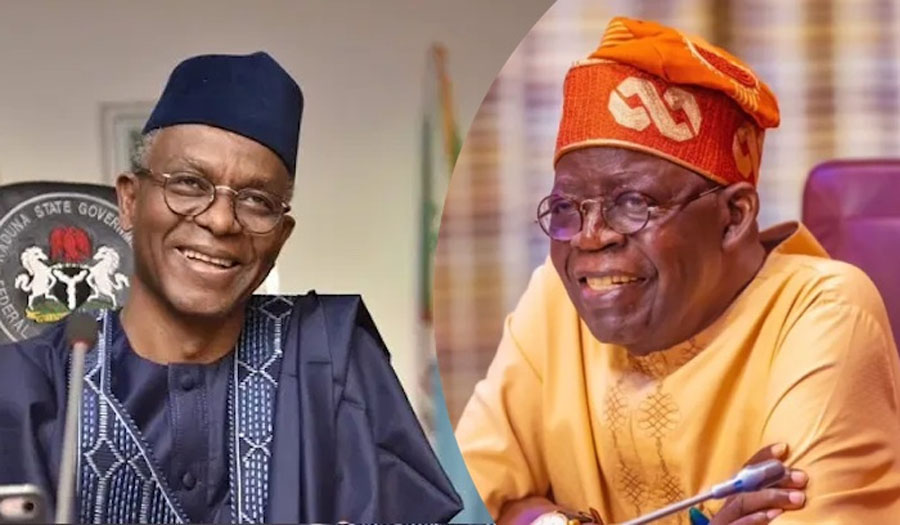
Tinubu, el-Rufai and the cobra
Tunde Odesola
(Published in The PUNCH, on Friday, February 20, 2026)
If they were not venomous, snakes would probably garland the necks of the rich and the influential to delineate social class. With a body handwoven by its Creator, the snake is the most awesome creature, epitomising engineering fluidity among wildlife. Its fleeting mobility, intricate symmetry, stretchy sinews, delicate precision and frightening fatality define a brute created without hurry.
If the Creator, in His infinite creativity, had swapped the rabies of the dog for the venom of the snake, the faintest bark would have sent feet fleeing, sticks wielding, and alarum bells ringing. Armed with just rabies as a weapon, the snake would have been handpickable like snails after rainfall; slithering and spitting alone do not deter like venom strike. Meat and skin, snakes are attractive.
If its venom was exchanged for rabies, the snake would probably have been Man’s best friend, barking through a slit mouth and narrow throat, without a noise. Before closing production on the evening of the Sixth Day, God assessed His production line; behold all things were bright and beautiful. So, he rested on the Seventh Day.
But Man and snake are not friends; one strikes the head, the other strikes the heel. This eternal enmity results in deaths within both camps, with the human casualty dripping with grief, while snakedom is griefless – Ọ̀dájú lọmọ ejò.
On the last day of January 2026, fast-rising soprano singer, Ifunanya Nwangene, curled up in bed, enjoying a sleep in her Abuja apartment. Later, a cobra crawled into bed with her. Ifunanya probably felt the snake crawl over her arm, and she tried to move her arm away from the uninvited visitor. When the cobra sensed that the arm, which was inanimate a while ago, was slowly becoming animate, it panicked and lashed out, sinking its fangs into the songbird’s wrist. With that split-second strike, the cobra blew out Ifunanya’s candles.
In minutes, a numbing pain in the wrist woke the songster up. She saw the bite and the swelling. Frantic, she made a call to her father, uncle and friends. This must be a bad dream, Ifunanya thought. Wake up, wake up, girl! But the Nightingale was slipping away. Death has crept in right in the safety of her room.
Following Ifunanya’s death, the BBC, in a February 7, 2026, story headlined “A singer’s tragic death highlights Nigeria’s snakebite problem,” reveals the controversy that trailed Ifunanya’s death. In the report, Ifunanya’s father, Christopher Nwangene, accused the Federal Medical Centre, Jabi, Abuja, of unprofessional treatment and lacking antivenom when she was rushed to the hospital. But the hospital refuted the allegations in a clap back, insisting that it had enough antivenom in stock and that Ifunanya received good treatment. The Chief Medical Director of the FMC, Saad Ahmed, explained that Ifunanya arrived over two hours after the snakebite. Ahmed’s allegation, however, beggars belief and raises the question: why would Ifunanya’s uncle and friend separately go in search of antivenoms and, indeed, buy some, if the hospital had the antidote?
READ ALSO:
- American Woman, 64, Alleges Embassy Mocked 27-Year-Old Fiancé Before Visa Denial
- Epstein, Ex-Israeli PM Named in Alleged Profiteering From Boko Haram Crisis
- CBN Policies, Foreign Inflows Drive Naira to Two-Year Peak
A nationwide backlash left a populace lamenting the preventable loss of a special talent. Christopher said the hospital’s medical staff should not have removed the tourniquet tied to her wrist to limit the venom from spreading to other parts of her body when the hospital did not have enough antivenom. Though the use of a tourniquet is no longer advisable as treatment for snakebite because it can cause tissue damage and increase the risk of amputation, Ifunanya’s father insisted that it was better for her daughter to be amputated than to die.
In its characteristic fire brigade method, the Nigerian Senate, without setting a timeline, called on the Federal Ministry of Health and the National Agency for Food and Drug Administration and Control to ensure hospitals across the country were stocked with safe, effective and affordable antivenoms. The Senate’s hollow directive typifies the futility of an imam’s rumbling stomach when presented with a dish of pork.
The lack of direction and commitment in the Senate directive on antivenom explains the lackadaisical legislation the nation gets when issues involve the masses, while diligence and speed attend legislation on issues that directly benefit lawmakers like constituency projects, car purchase and accommodation. The energy and time deployed by the Senate leadership under High Chief Godswill Akpabio to fight the Soyoyo from Kogi State, Senator Natasha Akpoti-Uduaghan, encapsulates the NFA metaphor of my youth. In my secondary school days, unserious students were called NFA, an acronym for No Future Ambition. Can the Nigerian masses attest that their National Assembly yesterday, today or tomorrow truly has people-oriented ambition, except talk loudly, cackle heartily, defect, and look towards the Presidency for patronage?
The venom economy, when measured through anti-venom and venom-derived therapeutics, is a multi-billion-dollar, fast-growing global market with respectable profitability driven by healthcare demand, innovation, and rising global incidence of venomous encounters. Nigeria, with its multitude of youth unemployment should tap into the global-venom market, but its clueless political class will not ensure any life-changing policy to push unemployment back.
When he was Health Minister six years ago, a former Speaker of the Lagos House of Assembly, Dr Olorunnimbe Mamora, described as ‘epidemic proportions’, the 20,000 snakebites recorded annually in Nigeria. That was six years ago. Today, the Toxinological Society of Nigeria says snakebite cases in Nigeria annually have climbed up to 43,000, making the need to produce antivenoms locally a matter of national duty. The Association of Community Pharmacists of Nigeria estimates that the country spends about $12million yearly importing antivenoms. A vial of imported antivenom, according to the BBC,costs between N45,000 and N80,000, necessitating the need for local production, export and job creation. But in Mamora’s alarm lay an underlying potential for the country to partake in the multi-billion-dollar global venom market, which included participants like scorpions, spiders, wasps, ants, etc.
The BBC report states that Nigeria’s snakebite “epidemic proportions” is “compounded by a critical shortage of affordable antivenom, which needs to be stored in fridges – often impossible in areas with unreliable electricity”. However, herbal medicine produced locally by traditional medicine practitioners does not need refrigeration. A 2005 study, “Effect of Annona senegalensis rootbark extracts on (cobra) Naja nigricotlis venom in rats,” published in the peer-reviewed Journal of Ethnopharmacology, showed the relative effectiveness of the rootbark of African custard apple in treating cobra venom.
READ ALSO:
- Edo Governor Okpebholo Names Mercy Johnson-Okojie Special Adviser
- Many Feared Dead as Suspected Lakurawa Militants Attack Kebbi Communities
- AMAC Polls Shock: Another PDP Candidate Withdraws from FCT Race, Backs APC
While the nation grappled with insecurity, hunger and poverty, there came a rumble from outside Aso Rock. A little mallam, Nasir el-Rufai, sat on a huge pile of peddles, singing a Fulani song, pelting the roof of the Villa with his pebbles. Aso Rock panicked. The embers of a recent coup are still glowing. When a fly perches on the scrotal sack, caution becomes the first commandment.
I daresay the former Kaduna State governor was the most vocal vendor of the Bola Tinubu electoral commodity to the North when members of the Fulani hegemony were afraid to openly side with the presidential candidacy of Tinubu while President Muhammadu Buhari reigned. Short men and daring deeds.
When everyone was afraid of Buhari, El-Rufai showed dogmatic courage and stood by his belief. And Tinubu won. After Tinubu’s victory, el-Rufai danced to Kizz Daniel’s Buga song with Tinubu over dinner. While Tinubu was bugga-ing in owambe fashion, el-Rufai was waltzing to Buga in the Fulani stick-across-the-neck dance style. I watched the dance again today. Laugh catch me. Between Tinubu and el-Rufai, someone was scratching their nose with the head of a cobra.
Before or after the deceitful dance, Tinubu publicly begged el-Rufai to come and work in his administration, and el-Rufai said he would work on a part-time basis because he had some personal issues to attend to. When Tinubu was compiling his list of ministers, el-Rufai also submitted his cv, but his name was shockingly flagged by security agencies.
I do not know what the mallam did to offend Jagaban, but I guess the President is just uncomfortable with the personality of the former governor. He probably sees Nasir as a stormy petrel who would be uncontrollable if allowed into the cabinet. The moral question that bubbles up from the depth of virtueless politics, therefore, is: “Why enlist el-Rufai to fight your battle when you knew you were going to dump him?”
Well, Nigerian politics lacked virtue before, during, and after the days of el-Rufai as Kaduna governor. In the murky waters of politics, fish eats fish, dog eats dog, snake eats snake. Tinubu is eating today; he might be eaten tomorrow.
So, when you see El-Rufai vehemently criticise Tinubu, e get why. No bi because of God. When Tinubu abuses Abubakar Atiku, na cruise. When Peter Obi knack Tinubu apako, na content. If Atiku tear Tinubu, na paddy-paddy matter. Dem all sabi wetin dem dey do. Dem go fight, dem go settle.
Nigerians love sports, especially football. In Brazil, football employs 3.3 million people, generating about $2bn annually. In the 2023/2024 season, the Premier League generated $6.34billion. Nollywood and the Nigerian music world, without government initiative, have grown to international repute, generating millions of dollars.
So, instead of our elected politicians and public officials snaking from one party to another in almajeri fashion, there should be a concerted national effort geared towards providing the dividends of democracy to the masses. Perhaps they have forgotten what the dividends of democracy are, here they are: security, healthcare, education, employment, welfare, infrastructure, etc.
Email: tundeodes2003@yahoo.com
Facebook: @Tunde Odesola
X: @Tunde_Odesola
Tinubu, el-Rufai and the cobra
Opinion
El Rufai’s Arise News mind game with Ribadu, By Farooq Kperogi

El Rufai’s Arise News mind game with Ribadu, By Farooq Kperogi
El Rufai’s Arise News mind game with Ribadu, By Farooq Kperogi
Opinion
Oshiomhole: Behold the 13th disciple of Christ

Oshiomhole: Behold the 13th disciple of Christ
-

 News3 days ago
News3 days agoSaudi Arabia Confirms Sighting of Ramadan Crescent, Fasting Begins Wednesday
-

 metro3 days ago
metro3 days agoLagos Woman Shares Ordeal After Alleged Rape, Sparks Nationwide Outcry
-

 News3 days ago
News3 days agoRamadan Begins in Nigeria as Sultan Confirms Crescent Sighting
-

 International22 hours ago
International22 hours agoCanada Opens New Express Entry Draw for Nigerian Workers, Others
-

 metro3 days ago
metro3 days agoSeven Killed in Horrific Crash at Ota Toll Gate
-

 News2 days ago
News2 days agoKorope Drivers Shut Down Lekki–Epe Expressway Over Lagos Ban (Video)
-

 Health2 days ago
Health2 days agoRamadan Health Tips: Six Ways to Stay Hydrated While Fasting
-

 metro22 hours ago
metro22 hours agoOsun Awards 55.6km Iwo–Osogbo–Ibadan Road Project to Three Contractors



